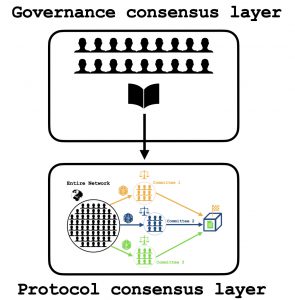
We have decided to vote for Option A in Governance Period 1, Algorand’s first and ongoing governance vote. Voting will conclude on November 14.
We thought it might be useful to publish why we are voting this way and hope to contribute to what is already an extremely vibrant community discussion.
Governance Period 1: What Is At Stake?
Starting in October this year, Algorand began transitioning toward decentralized governance. To participate in voting decisions, Governors lock up their ALGO for three month windows and then vote on proposed changes. They earn rewards by participating in governance. If they withdraw these ALGOs at any point, they lose the accrued rewards.
This describes the status quo (Option A).
Under Option B, not only will anyone who withdraws from governance lose the accrued rewards, they will also be slashed. Option B provides higher staking returns than Option A, designed to incentivize more community participation.
“Option B: Higher rewards and slashing. The Governance rewards amount for 2022 will be 362M Algos (90.5M per quarter) with a slashing mechanism: the rewards are distributed among the governors who vote and maintain the committed Algos in their wallet for the entire quarterly period. In case of failing to do so, Governors will be subject to an 8% slashing of their committed amount, on top of losing their rewards. The penalties that non-compliant governors pay will be returned to the global rewards pool in the AERP, to be used for future rewards.”
Option B Is At Odds With PPoS
We think that the introduction of slashing to Algorand governance could undermine some of the principles behind Pure Proof-of-Stake (PPoS). From the very beginning, Silvio Micali focused on PPoS as a protocol without incentives. The whole point is that unlike bonded PoS, there is no need to “punish bad behaviour”.
We believe that Algorand could become the most decentralized Layer 1 because of PPoS’ core properties. Cryptographic sortition is open to anyone. Every ALGO token has the same probability of being selected for the lottery. There are no major hardware requirements. Participants can buy more tokens, but they can’t privilege one ALGO against another.
Unlike bonded PoS, Algorand doesn’t need to punish bad behavior. Proposal B breaks from this “no slashing” ethos, introducing an explicit penalty for non-compliant Governors.
PPoS was designed to escape the drawbacks of conventional PoS. Consensus on Algorand is easy to achieve and difficult to subvert, so easy that it doesn’t need to introduce complex incentives to motivate behavior. In practice, this helps Algorand avoid the wealth inequality and increased centralization that plagues other PoS systems.
To some extent, we think that option B diverges from these core principles.
Incentives Are A Slippery Slope
Option B does not explicitly undermine PPoS. The vote is about the treatment of Governors, not consensus on transactions.

Even if Option B passes, PPoS maintains its advantages over traditional bonded PoS when it comes to consensus. Cryptographic sortition stays the same.
However, it could set a bad precedent more generally. We argue that incentives can become a slippery slope. Algorand’s goal should be to encourage network participation without needing to resort to carrots or sticks. This might take longer, but it’s better for the protocol in the long run. Once you start “centrally planning” incentives, it’s hard to go back to the “pure” environment originally envisioned by Algorand’s inventors. We run the risk of ending up where we started — slowly conceding to the ideas that underlie bonded PoS.
Short Term Incentives Vs. Long Term Incentives
Participating in consensus on Algorand is like running a Full Node on Bitcoin. Nobody pays you to run one: you do it because you believe in the network, and ultimately want to protect your holdings. Taken to its logical conclusion, this is a powerful dynamic, one that most PoS protocols struggle to replicate. In Bitcoin, we frequently have moments where Full Nodes exercise sovereignty and override powerful economic entities like miners — despite the fact that they aren’t receiving any portion of the block subsidy.
They are motivated by long term incentives. Similarly, we think that governance on Algorand should be encouraged through long term economic alignment, not something paid for with short term rewards. Being a Governor should be part of the culture of the network, it shouldn’t be a political subsidy.
In the short run, we would make more money if we voted for Option B. It likely incentivizes greater participation over the upcoming three month window.
In the long run, it’s not clear to us that this is a sustainable way to bootstrap governance. PPoS should have a similar political ethos to the Full Nodes: you do it because you want the network to be thriving in ten years, not because you’re being paid more over the next three months.
Algorand should motivate a self-driven culture of governance. The political process should be contested and contentious, but it shouldn’t need a handout. Slashing is analogous to mandatory voting. Do democracies which force their citizens to vote (or risk being slashed by a fine) end up with a more engaged civil society? We are skeptical of this idea.

In addition, rewards will eventually run out. If some participants are voting for yield, will they stick around when yield dries up? We think the status quo (Option A) will make Algorand governance more robust and sustainable, something that doesn’t need to rely on short term economic incentives, attracting Governors with a longer time horizon.
Conclusion
The Algorand Foundation has done an incredible job at rolling out decentralized governance. When we initially published our Algorand thesis in June, we loosely compared Algorand’s approach toward self-government with the American experiment. We’ve been pleasantly surprised at just how engaged the community has been. Regardless of the outcome, the Governors have been out in full swing, mostly on Reddit.
In Algorand’s spirit of “built-in evolvability”, we believe that participation at the Governance layer should remain open to all members of the network and align with the ethos of PPoS: governance should be easy to achieve but difficult to subvert.
Option B may serve the opposite function: it may result in Governance that is more difficult to achieve and easier to subvert.
We argue that introducing an explicit cost to non-compliant Governors (Option B) may unintentionally undermine PPoS.
PPoS is a very simple and elegant idea. It guarantees decentralization through self-selection, not complex incentives. Option B breaks from this simplicity and overlays a new, economically-motivated governance layer.
We hope this post was helpful and look forward to community feedback.

